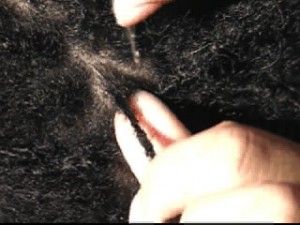Inside: If you’re wondering, “What causes loc breakage?”, the following may give you some insight as to why, as well as suggestions to stop future loc breakage.
No one wants to think about their locs breaking off.
Heck, no one wants to think about their hair breaking off, period, but it happens.
Hair breakage can be a result of anything from heat styling, to chemicals and more. And like loose hair, there are many reasons someone might look up and see a loc on the floor, pillow, or right off into your hand.
Why Your Locs May Be Breaking Off & How To Prevent It
Look over these possible causes of your loc breakage and see if one or more resonates with your situation and if so, make the necessary changes to see improvement.
Reason #1 – Pre-existing weak, fragile, damaged hair
If your hair was already in a vulnerable state prior to locking, your locs may suffer as well until all of the damaged hair has grown out.
You may even notice that the breakage occurs right where the newly grown out, healthier areas of your hair begin and the damaged hair ends – kinda like the line of demarcation when transitioning from relaxed hair to natural.
What you can do…
- Be gentle with your locs. Avoid any excessive pulling and tugging when handling them
- Deep condition, perhaps even consider a monthly protein treatment to help rebuild and strengthen, being sure to follow protein treatments with a moisturizing conditioner
- Keep ’em moisturized via leave-in conditioners and hydrating after-shampoo conditioners
- Tackle it from the inside out with a diet rich in good fats (real preferably grass fed butter, coconut/coconut oil, olive oil, cod liver oil/capsules), protein (meat preferably grass fed, nuts/nut butters, eggs, shakes), fruits and vegetables, and a good quality supplement.
Reason #2 – Wrong sized locs for your hair density
If you have thin, fine-textured hair and your locs are too thick; the weight of the locs could potentially cause breakage.
Some may disagree with me, but I’ve always said it makes more sense for thinner hair to have smaller, lightweight locs; while thicker hair with more density should have medium to large loc sections.
Not only does having thinner-sized locs on fine, thin hair create the illusion of more volume, but thinner locs mean lightweight locs – which is perfect for lightweight hair!
What you can do…
If you have thin, fine hair but feel you may have chosen too large of a size, there’s not a whole lot you can do to change the size short of taking them down and splitting the sections in half.
And unless your hair hasn’t been locked very long (no more than a year, two at the most and that’s pushing it) you probably don’t want to do that.
However, what you can do is:
- Wear loose styles. Try not to wear styles that pull on your roots too much. If you’re going to wear a ponytail, for example, make sure it’s not too tight.
- Keep your roots maintained. I’ve found that when you allow your new growth to go too long without being retwisted or interlocked, your hair is more susceptible to breakage. Why? Because you have these loose, somewhat vulnerable strands holding up the weight of your tightly-packed locs. Couple that with fine strands of hair, thin density, and styling and you have just created a recipe for potential loc breakage. But with that, be sure that you…
- Don’t over twist or tighten. Whether you maintain your new growth with twisting or interlocking, be sure not to have it done too tightly. Which leads me to…
Related: Thick Locs VS Thin Locs: Is One Better Than The Other?
Reason #3 -Tightening too frequently & too tightly
I’ve seen it time and time again… folks getting a little too anal about not showing ANY new growth at all, and therefore tighten their locs above and beyond what is needed, both in tightness and in frequency.
This is no different than getting braids done too tightly and ending up with traction alopecia. The same can happen if you insist on (interlock) tightening your locs more than every 4-6 weeks!
This ALSO goes for palm rolling, not just interlocking.
When you catch yourself constantly twirling or twisting your locs… stop. Pop your own hand or snap a band around your wrist if you have to. But resist the urge.
If you’re constantly feeling your roots, then unconsciously interlocking them with a tool or your fingers… again, stop.
And when you’re legit tightening/twisting your roots because it’s actually time for maintenance, don’t do it too tightly to where your scalp is super-sore afterward. Always allow a little “give” by leaving about 1/8″ from loc to scalp.

Reason #4- Going too long between tightenings
Not only can you retwist or tighten your roots too frequently, but you can also do it too infrequently. This is typically the case when your locs are on the thinner side. If you have medium to large locs, this shouldn’t pose as much of an issue if you decide to free form.
But microlocs, no matter how they were installed, should be retightened at least monthly – at most, every other month. Too much new growth, coupled with constant styling or even simply separating thin locs, can wear on them and cause weakening of the root beds.
So, if you have locs that are smaller than pencil-width, be sure to stay on top of your root touchups!
Reason #5- Wearing styles that pull tightly on the hair too frequently
Yep, even something as “innocent” as a ponytail, if done too tightly and worn too often, can cause breakage and hairline trauma.
Don’t get me wrong… it’s fine to wear your hair pulled back with head bands, in a ponytail, or cornrow-type styles. Just give your hair a break sometimes by wearing it down, or just making sure you’re not pulling it back too tightly.
When your locs are long enough, you’ll be able to tie your hair back with your own hair! Doing so gives just the right amount of tightness without a lot of the tension you get by using bands.
And if you need things smoothed out around the hairline, lightly mist with water and tie down with a silky/satiny scarf for 10-15 minutes or longer, then take it off when you’re ready to head out!
Reason #6 – Gaps within interlocked locs
When using interlocking methods of tightening your new growth, if not done properly you might end up with gaps in your locs. If this is not corrected and the gaps closed up, over time these areas can possibly get weak and end up breaking.
Therefore, it’s important to:
1.) Be sure that you are tightening correctly and not re-entering the same space over and over, forming a gap.
2.) Close up any gaps if you do end up with them
Reason #7 – Hair & scalp conditions

There are certain hair & scalp conditions that can cause hair loss and breakage.
When my youngest daughter was locked back when she was younger, severe eczema caused her to experience the loss of a couple of her locs.
For others, it could be psoriasis, alopecia (unrelated to tension), and other conditions.
If you are experiencing anything of the such, I recommend seeing your Dermatologist or other health care practitioner for advice on treating the cause of the issue – though, in the case of my daughter, changing her diet played a very key role in greatly minimizing her eczema.
Reason #8 – Health conditions, medications & surgical procedures
Back when I used to do hair, I had the scare of a lifetime!
One of my clients came in to get her weave (that I installed) taken out. As I was removing the tracks, her HAIR was also coming out in clumps. My heart dropped to the floor. Did *I* cause this?
So, I braced myself and showed her what was going on. She was astonished. Then it just came to me and I asked one simple question:
“Have you recently had surgery?”
Client: “Yes, I have. How’d you know?”
Me: “I didn’t. And are you on any newly-prescribed meds?”, I asked.
Client: “Yes, I am. In fact, now that I think about it, the doctor did mention that one of the side effects was hair loss.“
GURL! I can’t even begin to describe the relief I felt when I realized I wasn’t about to be sued out of my draws.
Said all that to say…
Unfortunately, there are some instances where hair loss is just out of our control, such as when there are medical procedures or medications involved.

The main thing I can advise is that you start taking preventative measures (diet, exercise, supplements, etc) to prevent/avoid some of the health conditions that would warrant certain procedures or medications in the first place.
Secondly, if it’s too late, then do all you can to get your body and health back in order and in balance so that you can possibly get OFF of those meds!
Reason #9 – Stress
Stress is a MAJOR cause of hair breakage and hair loss! And while it can be one of those things beyond your control, in many instances, it’s actually something we can do control in one way or another.
Find the root source of stress be it people, work, family, etc and where you can, address and eliminate it as much as possible.
Areas that you can’t necessarily control or stop the source of your stress, control the way you react to it.
Prayer, meditation, affirmations, therapy… do whatever you need to do as long as it doesn’t cause harm.
A Few Other Contributing Factors To Loc Breakage
There are other underlying reasons your locs may break off, including:
- excessive dryness of the hair (and scalp). Moisturize, moisturize, moisturize!
- dehydration and not drinking enough water to moisturize from the inside out
- poor diet lacking proper nutrients for healthy hair
- essential fatty acids missing from your diet
… all of which can be combated relatively easily.
And then there are those “freak accidents” such as longer locs getting caught under the strap of your bag or purse and getting pulled out. But unless it was a really HARD pull, I can’t really see that being a huge factor unless the loc(s) was already weak due to one of the aforementioned causes.
Just be careful either way!
Taking preventative measures is the absolute BEST thing to do, but in the unlikely event that you DO lose any of your locs, you can always reattach them.
But the most important thing is to get to the root (no pun intended) cause and deal with it at the source so that losing your locs doesn’t become commonplace.
Blessings & Warmest Regards,